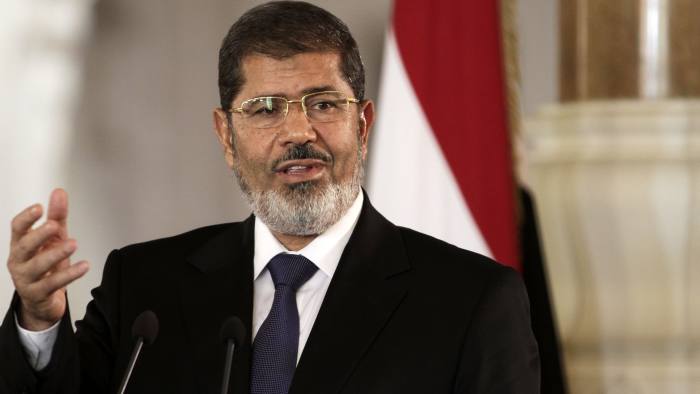The Egyptian Public Prosecution has created a new list to include people on terrorist lists, which violates the legal procedures stipulated and in force for years. This list contains the names of deceased people, such as the former President of the Republic, Muhammad Morsi and the leader of the Muslim Brotherhood, Essam El-Erian. Experts believe that the Public Prosecution’s decision is a new episode in a long series of legal violations committed by one of the justice institutions due to its subordination to the executive authority, which turned it into a repressive tool used to settle political scores and commit human rights violations.
Illegal decisions
Last Thursday, the Egyptian Official Gazette published two decisions to list terrorists, issued by the first attorney general and head of the Office for Organizing Lists of Terrorist Entities and Terrorists, instead of being recorded by a criminal court decision, as stipulated in Terrorist Entities Law No. 8 of 2015. The first decision included the inclusion of 10 people described as “convicted” on the official list of terrorism, including former President Mohamed Morsi, who died in prison on June 17, 2019, and the leader of the Muslim Brotherhood, Essam El-Erian, who died on August 13, 2020. This means that the terrorist lists are no longer limited to the living suspects only, contrary to the law stipulating that all the lawsuits against them expire upon death.
The new listing decision, which the prosecution called the “official list of terrorism,” was based on the law organising lists of terrorist entities and terrorists. It also relied on criminal and cassation rulings previously issued against these persons in politicised cases. This is the first time the Public Prosecution has issued a list of terrorists in this way instead of the procedures stipulated in the Terrorist Entities Law. Indeed, it is included in this law that the Public Prosecutor has to submit a request to include persons and entities on terrorist lists to a criminal court held in a consultation room, accompanied by investigations, documents, or information, so that the court can decide whether or not to put names and entities on the list.
The inclusion on the terrorist lists has many effects, most notably the inclusion on the travel ban lists, the anticipation of arrival, freezing of funds and all other assets, the dismissal from government jobs, and the loss of the excellent reputation necessary to assume public or parliamentary functions. The decision also affects the future of people on these lists, as they are unlawfully banned from government jobs or membership in police and military academies or judiciary and diplomacy institutions.
Repressive tool
The Egyptian constitution stipulates that “the public prosecution is an integral part of the judiciary.” Therefore, it must be characterised by independence, impartiality, and adherence to the law. However, this does not happen in reality, as the public prosecution has turned into a pawn in the hands of the government, through which it passes whatever decisions it wants without respecting the law. One of the most prominent examples of this is what happened in the case of the mysterious death of researcher and economist Ayman Hadhoud inside the Abbasiya Mental Health Hospital after his arrest. In this case, there was a collaboration between security services and the public prosecution to close the topic, claiming that “Hadhoud” died due to a “chronic heart condition”. At the same time, shocking leaked photos of the researcher’s body show traces of burns and torture on his face, and possibly a fracture in his skull, and independent experts suggest that he was beaten on the head, which caused him hematoma or bleeding in the brain, which led to his illness and death because he did not receive the necessary medical care.
The Public Prosecution ignored all the questions about the circumstances of Hadhoud’s enforced disappearance in a mental hospital and previously denied that he had been arrested, then returned and admitted his death about a month before informing his family. At the same time, the law stipulates that the notification should be within 24 hours of the end. Another example of the Egyptian prosecution’s lack of independence and integrity is what happened in the case of the young Italian researcher Giulio Regeni, who was tortured to death by security forces in 2016. To close the topic, the Ministry of Interior killed four simple citizens, claiming that they were thieves who had stolen and killed Regeni. When Italy rejected this fabricated account and began an independent investigation of the case, it discovered that its citizen had been tortured to death by higher orders from leaders in the National Security Agency (Political Security Apparatus). At the same time, the Egyptian prosecution refused to cooperate with its Italian counterpart and closed the case claiming that “the killer is unknown.”
Local and international human rights organisations confirm that the Egyptian prosecution is a “partner” in human rights violations in Egypt. In November 2019, Amnesty International released a report documenting how the Supreme State Security Prosecution, a branch of Egypt’s public prosecution, routinely misused the anti-terrorism law to prosecute thousands of peaceful critics of the government and to disrupt fair trial guarantees. The report exposes the prosecution’s conspiracy in cases of enforced disappearance, arbitrary deprivation of liberty, torture and other ill-treatment, and the prolonged detention of thousands of people on trumped-up reasons. Egypt ranks 135 out of 140 countries in the Rule of Law Index 2022, issued by the Global Justice Project, an international civil society organisation promoting the worldwide rule of law. According to the organisation, one of the reasons for Egypt’s low rank in the index is the weakness of the civil justice system and its corruption, as well as its submission to the influences of the executive authority, its slow litigation process and the incompetence of judges.





Recent Comments